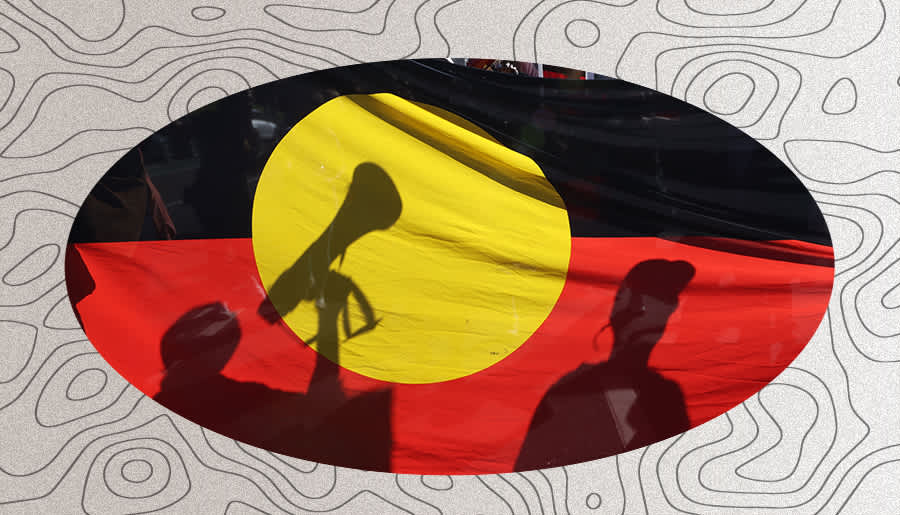NAIDOC Week celebrates and recognised the history, culture and achievements of Aboriginal and Torres Strait Islander peoples. It’s an opportunity for all Australians to learn about First Nations cultures and histories. The Latch team is sharing stories to help educate, honour and guide in our continued to push for change, so be sure to find all our pieces here. Val Morgan Digital acknowledges the Traditional Custodians of Country throughout Australia and their connections to land, sea and community. We pay respect to their Elders past and present and extend that respect to all Aboriginal and Torres Strait Islander peoples.
“Get Up! Stand Up! Show Up!” This is the theme of this year’s NAIDOC Week. According to the event’s website, the theme that they chose is all about encouraging individuals to fight for Aboriginal and Torres Strait Islander communities in meaningful ways. They stated, “We all must continue to Get Up! Stand Up! Show Up! for systemic change and keep rallying around our mob, our Elders, our communities.” Their website also said, “Whether it’s seeking proper environmental, cultural and heritage protections, Constitutional change, a comprehensive process of truth-telling, working towards treaties, or calling out racism—we must do it together.”
Now, as a person who’s whiter than a polar bear that’s rolled in caster sugar, it’s truly not my place to be holding the megaphone, instructing BIPOC on how they must respond to this year’s NAIDOC Week theme. So, instead, I would like this opportunity to chat to those who find themselves in a similar position. Today, we’re going to address the fact that when NAIDOC uses the words “we all” or “we must do it together,” they’re not just addressing First Nations peoples, they’re talking to everyone. Moreover, it’s vital that we don’t just “Get Up! Stand Up! Show Up!” this week, we have to do it every week moving forward.
It’s vital that we support First Nations peoples in their march towards justice. Because, as NAIDOC outlined, they’re fighting this war on so many fronts. These communities are constantly up against racist and systematic attacks on sovereign land that was never ceded. For instance, according to a Family Matters report, too many Aboriginal and Torres Strait Islander children are being taken away from their parents and placed in out-of-home care. As of June 30 2020, more than 21,523 of these kids were in such a predicament and 79% of them lived consistently away from their birth parents.
Another calamitous statistic comes from the Australian Institute of Criminology. Between 1991 and 2021, there have been 489 First Nations deaths in custody. Again, 489 deaths. As Jamie McConnachie, from the National Aboriginal and Torres Strait Islander Legal Services, told The Guardian, “To have lost 500 of our people in custody since the royal commission handed down their recommendations over 30 years ago is beyond heartbreaking.”
Related: How to Be An Indigenous Ally
Related: How to Know What Indigenous Land You’re On
These issues have roots that are thick, deep, and maddeningly stubborn. They will not get resolved by the end of this NAIDOC Week. You cannot tweet about them this arvo, go into a slumber until Invasion Day, and be on the frontline of this war. Kids are being taken from their families. People are dying in prisons. These facts are unacceptable, so we need to go to protests, call our Senators, and back up First Nations peoples consistently throughout each year.
Moreover, you supporting First Nations issues could actually make a difference. The more people that routinely fight for change, the more pressure the powers at be will feel. The goal is push these powerful people into changing the systems that they wield. If our collective pressure doesn’t have the desired effects, then we find ways of ramping it up and making it more intense.
It’s worth noting that there are even more ways you can support First Nations peoples throughout each year. If you have the funds, you could send a monthly donation to a place like Pay The Rent. According to their website, Pay The Rent “enables funds to be contributed by individuals directly to grassroots causes and campaigns with a focus on protecting First Nations rights.” You can also make sure that you’re listening to First Nations Voices, such as Barkaa and Felicia Foxx.
If you want to learn some additional info about First Nations peoples, cultures, and histories, then here’s a useful list of articles that have been published by The Latch:
How Labor Plans to Help Indigenous People
10 Films Made by First Nations Directors
8 Must-Listen Podcasts by First Nations Creators
7 Indigenous Australian Sacred Sites to Learn About Aboriginal Culture
10 of Australia’s Most Incredible Indigenous Experiences
12 Must-Read Books From First Nations Authors
NAIDOC’s 2022 School Resource Can Teach More Than Just Kids
Read more stories from The Latch and subscribe to our email newsletter.







